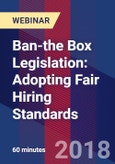Why Should You Attend:
“Ban-the Box” refers to the box on employment applications requiring applicants to disclose whether they have a prior criminal conviction. Current law prohibits employers from requesting or considering a candidate’s conviction history until a conditional offer of employment has been made. Ban-the-Box is intended to push a background check later into the hiring process so that employers consider the applicant’s qualifications before their criminal history. An employer’s use of an individual’s criminal history in making employment decisions may violate the prohibition against employment discrimination under Title VII of the Civil Rights Act of 1964, as amended.Nationwide, over 150 states, cities and counties have different requirements as to when employers may request a criminal history or run a background check and what they can do with that information. If an employer runs a background check after a conditional offer of employment has been made, care must be taken before any adverse decision is communicated to the applicant as there are strict regulations governing this process. It’s anticipated in the near future that existing laws will broaden their reach to include private employers, resulting in greater enforcement of these laws. Therefore, employers need to understand their respective state and city laws in order to become and/or remain compliant.
Attend this webinar to understand in details what are your city and state laws regarding usage of criminal records while screening applicants and what are best practices, green factors and criminal conduct screening.
Areas Covered in the Webinar:
- Understanding Title VII of the Civil Rights Act of 1964
- Ensuring conviction information is used fairly in the hiring process
- Integrating the EEOC arrest and conviction record guidelines into the hiring process
- Employers’ best practices when using criminal history information
- The EEOC’s interest in Employer’s use of criminal records in employment screening
- Determining disparate impact of policies and practices that screen individuals based on records of criminal conduct
- Determining whether a criminal conduct exclusion is job-related and consistent with business necessity
- Identifying the nature and gravity of the criminal offense or conduct
- Fair-chance policies: Do they work?
- What fair-chance policies DON’T do
- Green factors and criminal conduct screenings
- Determining the nature of the job being sought and understanding how that information is utilized in fair hiring processes
Who Will Benefit:
- Senior Leadership
- Human Resource Managers & Representatives
- Recruiting Staff
- Managers & Supervisors
- Compensation Professionals
- Compliance Professionals
Speaker
Diane L DeeCourse Provider

Diane L Dee,









